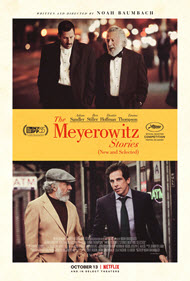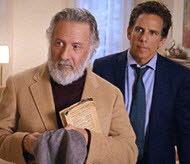The Meyerowitz Stories (New and Selected)
Reviewed by: Gabriel Mohler
CONTRIBUTOR
| Moral Rating: | Very Offensive |
| Moviemaking Quality: |
|
| Primary Audience: | Adults Young-Adults |
| Genre: | Drama |
| Length: | 1 hr. 52 min. |
| Year of Release: | 2017 |
| USA Release: |
October 1, 2017 (festival) October 13, 2017 (Netflix) |




The importance of forgiveness in estranged families

Pornography can easily ruin the lives of all those involved.
PORNOGRAPHY—How can I tell if I’m getting addicted to pornography or sex? Answer
SEXUAL LUST—Why does God strongly warn us about it? Answer
TEMPTATIONS—How can I deal with temptations? Answer






| Featuring |
|---|
|
Adam Sandler … Danny Dustin Hoffmann … Harold Ben Stiller … Matthew Sigourney Weaver … Sigourney Weaver Emma Thompson … Maureen Adam Driver … Randy Candice Bergen … Julia Grace Van Patten … Eliza Meyerowitz Judd Hirsch … L.J. Shapiro Elizabeth Marvel … Jean Meyerowitz See all » |
| Director |
| Noah Baumbach — “The Squid and the Whale” (2005), “Greenberg” (2010), “Frances Ha” (2012), “Margot at the Wedding” (2007) |
| Producer |
|
Noah Baumbach Eli Bush See all » |
| Distributor |
“The Meyerowitz Stories” is a film that will be received differently by everyone—some will blow it off without a second thought; others will think and talk about it for hours. Information-wise, it’s the 4th and final film in Adam Sandler’s contract with Netflix. Adam Sandler and Ben Stiller play the leads, as the film follows a series of events that reunite estranged family members.
For as long as I can remember, I’ve been hoping that Adam Sandler will someday grow up from the low-brow comedy that’s expected from him. The first 2 films in the Netflix contract strongly perpetuated it (and are considered by many to be two of his worst films ever), but the 3rd one, while still pretty dumb, did distance him from unrestrained grotesqueness. “The Meyerowitz Stories” is unquestionably the best of the 4, and probably his best in a while… but that doesn’t say much.
The good news is, I can finally say it: in this film, Adam Sandler does break entirely away from crude humor. Notice I didn’t say all inappropriate content—but he does show that he is capable of carrying the lead of a mature film. The film is not a comedy; it’s a very heavy and serious drama.
That said, there is still enough offensive content for me to urge viewers to avoid it. There is a scene of gratuitous crudeness that is not meant to be humorous, but still shows way too much to be justified. The film deals with many different family issues, and one of them is a daughter going away to college, leaving the care of her father. Shortly after this, her father sees a pornographic video she made with friends—and we see it, too. Bare breasts, simulated sex scenes, and salacious dialog are all a part of this. It only lasts probably less than a minute, and is the only sexually graphic scene in the film, but it’s hard to forget.
The purpose of the scene is to show how a father can be taken aback when a child so strongly abuses freedom at the first opportunity, but I still can’t cut it any slack for its intentions. It doesn’t help that the father comes to terms with it at the end, rather than taking moral stand.
There is also a scene in which a woman describes the traumatic experience of having a man expose himself to her. This is described in some unnecessary detail, but is not shockingly explicit. There are also a handful of slang sexual references…
… which leads us to language. My count may be a little shy, because I caught myself daydreaming several times during the film (see the next paragraph), but the amount I did count should be enough to sway viewers in another direction. There are almost 10 misuses of God’s names (including one paired with d**n), over 30 f-words, about 5 uses of a** and b***h, and over 20 s-words.
As for the quality, the film drags quite a bit. It’s basically a series of conversations between family members about all the various things most families go through. The viewer can never tell exactly where the plot is going, or what is the purpose of watching a bunch of conversations that contain details that the viewer has no reason to care about (not necessarily offensive things, just trivial things like dates, room numbers, or shopping bills).
However, I have to give the film credit for being realistic. It’s like watching a section of the average modern American’s life—pure and uncut. It’s not meant to be just entertaining; it’s meant to paint a fictional portrait of extended family interactions in a believable way that audiences can relate to. And in this, the film is a resounding success.
There are ups and downs, celebrations and funerals, laughing and crying, and all the other twists and turns that everyone faces as their years pass. I can’t deny that I’m hard pressed to think of any other film I’ve seen with such genuine heart.
However, in the end, the negative side of this film overpowers the positive. Secular critics have spoken very positively of it, and while I can understand that, I can’t get on that bandwagon myself.
This film does not attempt to teach any moral message; it’s just a film about life at its most simplistic. Even secular storytellers generally understand that following Biblical principles is best—granting forgiveness, family bonding, etc. However, it is saddening to see the characters in this film struggle just to keep their lives intact. I cannot help but be reminded of how much more at peace people like this would be if they were following God, praying about their decisions, and waiting for the will of God with patience and true love.
In God’s sight, it is totally unacceptable for a Christian to refuse to forgive others.
Remember the parable of the master who forgave a guilty man who owed him an amount so enormous that he could never hope to pay it back? The master completely forgave him. But, afterward, that forgiven man roughly grabbed another who owed him a very small amount, and allowed him no time to repay—showed him no mercy—and threw him into prison. When the master heard of this, he was FURIOUS and his punishment was swift.
In that parable, the Master represents God. And the forgiven man represents you, IF you have similarly FAILED to forgive another, when Christ’s blood has paid your unpayable debt to God, and He has forgiven you for everything you have ever done wrong—and for your continuing failures to do everything that is truly right and good.
Therefore, we have a responsibility to be humble, forgiving, loving servants of God.
Despite uplifting messages about forgiveness and the lasting bond of family, the language and sexual content automatically disqualify it from recommendation to Christian viewers.
And I’m not convinced that they’ll be missing much, because, despite the praiseworthy originality of its approach to storytelling, its power to inspire only lasts for the duration of the film. If you get up for a drink of water after watching it, you’ll forget all about it by the time you’ve swallowed.
And that concludes Adam Sandler’s Netflix contract. While it hasn’t brought about the film I was hoping for, it just may have pulled Adam Sandler out of his cesspool. Hopefully the sober-mindedness of this film will stick, and he’ll go on a path to doing better films as the result.
- Violence: Mild—a scuffling match
- Profane language: Heavy
- Vulgar/Crude language: Very Heavy
- Nudity: Heavy
- Sex: Very Heavy
See list of Relevant Issues—questions-and-answers.


PLEASE share your observations and insights to be posted here.


